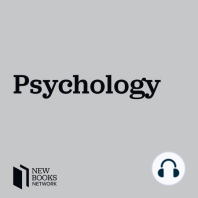46 min listen

Stephen E. Nadeau, “The Neural Architecture of Grammar” (MIT Press, 2012)
Stephen E. Nadeau, “The Neural Architecture of Grammar” (MIT Press, 2012)
ratings:
Length:
63 minutes
Released:
Apr 13, 2013
Format:
Podcast episode
Description
Although there seems to be a trend towards linguistic theories getting more cognitively or neurally plausible, there doesn’t seem to be an imminent prospect of a reconciliation between linguistics and neuroscience. Network models of various aspects of language have often been criticised as theoretically simplistic, custom-made to solve a single problem (such as past tense marking), and/or abandoning their neurally-inspired roots.
In The Neural Architecture of Grammar (MIT Press, 2012), Stephen Nadeau proposes an account of language in the brain that goes some way towards answering these objections. He argues that the sometimes-maligned Parallel Distributed Processing (PDP) approach can genuinely be seen as a way of modelling the brain. Combining theoretical, experimental and biological perspectives, he proposes a model of language function that is based upon these principles, proceeding concisely all the way from concept meaning to high-level syntactic organisation. He proposes that this model offers a plausible account of a wealth of data from studies of normal language functioning and, at the same time, a convincing perspective on how language breaks down as a consequence of brain injury.
Within an hour, it’s hard to do justice to the full complexity of the model. However, we do get to discuss much of the background and motivation for this approach. In particular, we talk about the emergence of PDP models of concept meaning and of phonological linear order. We consider the relations between this concept of meaning and the increasingly well-studied notion of ’embodied cognition’. And we look at the aphasia literature, which, Nadeau argues, provides compelling support for a view of language that is fundamentally stochastic and susceptible to graceful degradation – two automatic consequences of adopting a PDP perspective. We conclude by touching on the potential relevance of this type of account for treatments for aphasia.
Learn more about your ad choices. Visit megaphone.fm/adchoices
Support our show by becoming a premium member! https://newbooksnetwork.supportingcast.fm/psychology
In The Neural Architecture of Grammar (MIT Press, 2012), Stephen Nadeau proposes an account of language in the brain that goes some way towards answering these objections. He argues that the sometimes-maligned Parallel Distributed Processing (PDP) approach can genuinely be seen as a way of modelling the brain. Combining theoretical, experimental and biological perspectives, he proposes a model of language function that is based upon these principles, proceeding concisely all the way from concept meaning to high-level syntactic organisation. He proposes that this model offers a plausible account of a wealth of data from studies of normal language functioning and, at the same time, a convincing perspective on how language breaks down as a consequence of brain injury.
Within an hour, it’s hard to do justice to the full complexity of the model. However, we do get to discuss much of the background and motivation for this approach. In particular, we talk about the emergence of PDP models of concept meaning and of phonological linear order. We consider the relations between this concept of meaning and the increasingly well-studied notion of ’embodied cognition’. And we look at the aphasia literature, which, Nadeau argues, provides compelling support for a view of language that is fundamentally stochastic and susceptible to graceful degradation – two automatic consequences of adopting a PDP perspective. We conclude by touching on the potential relevance of this type of account for treatments for aphasia.
Learn more about your ad choices. Visit megaphone.fm/adchoices
Support our show by becoming a premium member! https://newbooksnetwork.supportingcast.fm/psychology
Released:
Apr 13, 2013
Format:
Podcast episode
Titles in the series (100)
Jonathan Metzl, “The Protest Psychosis: How Schizophrenia Became a Black Disease” (Beacon Press, 2010): Schizophrenia is a real, frightening, debilitating disease. But what are we to make of the fact that several studies show that African Americans are two to three times more likely than white Americans to be diagnosed with this malady, by New Books in Psychology